
Mali, officially the Republic of Mali, is a landlocked country in West Africa. Mali is the eighth-largest country in Africa, with an area of over 1,241,238 square kilometres (479,245 sq mi). The country is bordered to the north by Algeria, to the east by Niger, to the northwest by Mauritania, to the south by Burkina Faso and Ivory Coast, and to the west by Guinea and Senegal. The population of Mali is 21.9 million, 67% of which was estimated to be under the age of 25 in 2017. Its capital and largest city is Bamako. The country has 13 official languages, of which Bambara is the most commonly spoken.

The Tuareg people are a large Berber ethnic group that principally inhabit the Sahara in a vast area stretching from far southwestern Libya to southern Algeria, Niger, Mali, and Burkina Faso. Traditionally nomadic pastoralists, small groups of Tuareg are also found in northern Nigeria.
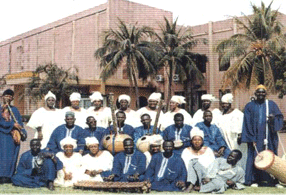
The music of Mali is, like that of most African nations, ethnically diverse, but one influence predominates: that of the ancient Mali Empire of the Mandinka. Mande people make up around 50% of Mali's population; other ethnic groups include the Fula (17%), Gur-speakers 12%, Songhai people (6%), Tuareg and Moors (10%).

An unmanned combat aerial vehicle (UCAV), also known as a combat drone, fighter drone or battlefield UAV, is an unmanned aerial vehicle (UAV) that is used for intelligence, surveillance, target acquisition, and reconnaissance and carries aircraft ordnance such as missiles, anti-tank guided missiles (ATGMs), and/or bombs in hardpoints for drone strikes. These drones are usually under real-time human control, with varying levels of autonomy. UCAVs are used for reconnaissance, attacking targets and returning to base; unlike kamikaze drones which are only made to explode on impact, or surveillance drones which are only for gathering intelligence.
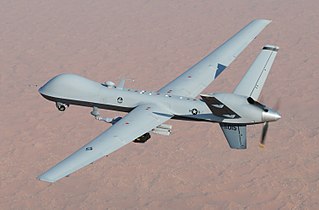
The General Atomics MQ-9 Reaper is an unmanned aerial vehicle capable of remotely controlled or autonomous flight operations, developed by General Atomics Aeronautical Systems (GA-ASI) primarily for the United States Air Force (USAF). The MQ-9 and other UAVs are referred to as Remotely Piloted Vehicles/Aircraft (RPV/RPA) by the USAF to indicate ground control by humans.
Between 2004 and 2018, the United States government attacked thousands of targets in northwest Pakistan using unmanned aerial vehicles (drones) operated by the United States Air Force under the operational control of the Central Intelligence Agency's Special Activities Division. Most of these attacks were on targets in the Federally Administered Tribal Areas along the Afghan border in northwest Pakistan. These strikes began during the administration of United States President George W. Bush, and increased substantially under his successor Barack Obama. Some in the media referred to the attacks as a "drone war". The George W. Bush administration officially denied the extent of its policy; in May 2013, the Obama administration acknowledged for the first time that four US citizens had been killed in the strikes. In December 2013, the National Assembly of Pakistan unanimously approved a resolution against US drone strikes in Pakistan, calling them a violation of "the charter of the United Nations, international laws and humanitarian norms."
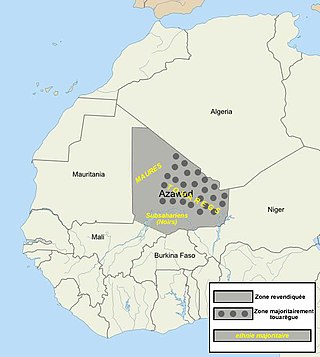
The 2012 Tuareg rebellion was the early phase of the Mali War; from January to April 2012, a war was waged against the Malian government by rebels with the goal of attaining independence for the northern region of Mali, known as Azawad. It was led by the National Movement for the Liberation of Azawad (MNLA) and was part of a series of insurgencies by traditionally nomadic Tuaregs which date back at least to 1916. The MNLA was formed by former insurgents and a significant number of heavily armed Tuaregs who fought in the Libyan Civil War.

The National Movement for the Liberation of Azawad or the Azawad National Liberation Movement, formerly the National Movement of Azawad, is a militant organization based in northern Mali.

The Battle of Gao was fought between the National Movement for the Liberation of Azawad (MNLA) and the Islamist Movement for Oneness and Jihad in West Africa (MOJWA), along with its ally Ansar Dine, in Gao between 26–28 June 2012. By the 28 June, Gao, Timbuktu and Kidal, the three biggest cities in the disputed secessionist region of Azawad within what is recognised as Malian territory, were under the control of Ansar Dine and its Islamist allies.

The Mali War is an ongoing conflict that started in January 2012 between the northern and southern parts of Mali in Africa. On 16 January 2012, several insurgent groups began fighting a campaign against the Malian government for independence or greater autonomy for northern Mali, which they called Azawad. The National Movement for the Liberation of Azawad (MNLA), an organization fighting to make this area of Mali an independent homeland for the Tuareg people, had taken control of the region by April 2012.

The United Nations Multidimensional Integrated Stabilization Mission in Mali was a United Nations peacekeeping mission in Mali. MINUSMA was established on 25 April 2013 by United Nations Security Council Resolution 2100 to stabilise the country after the Tuareg rebellion of 2012, and was terminated over a decade later on 30 June 2023. Officially deployed on 1 July 2013, MINUSMA was the UN's second-most dangerous peacekeeping mission after Lebanon, with 304 peacekeepers killed out of a force of about 15,200 as of May 2023.

Operation Barkhane was a counterinsurgency operation that started on 1 August 2014 and formally ended on 9 November 2022. It was led by the French military against Islamist groups in Africa's Sahel region and consisted of a roughly 3,000-strong French force, which was permanently headquartered in N'Djamena, the capital of Chad. The operation was led in co-operation with five countries, all of which are former French colonies that span the Sahel: Burkina Faso, Chad, Mali, Mauritania and Niger. Mali was a part of the operation until August 2022. The countries are collectively referred to as the "G5 Sahel". The operation was named after a crescent-shaped dune type that is common in the Sahara desert.

United States drone strikes in Yemen started after the September 11, 2001 attacks in the United States, when the US military attacked the Islamist militant presence in Yemen, in particular Al-Qaeda in the Arabian Peninsula using drone warfare.

The Islamic State – Sahel Province (ISSP), formerly known as Islamic State in the Greater Sahara (IS-GS), is an Islamist militant group adhering to the ideology of Salafi Jihadism. IS-GS was formed on 15 May 2015 as the result of a split within the militant group Al-Mourabitoun. The rift was a reaction to the adherence of one of its leaders, Adnan Abu Walid al-Sahraoui, to the Islamic State. From March 2019 to 2022, IS-GS was formally part of the Islamic State – West Africa Province (ISWAP); when it was also called "ISWAP-Greater Sahara". In March 2022, IS declared the province autonomous, separating it from its West Africa Province and naming it Islamic State – Sahil Province (ISSP).
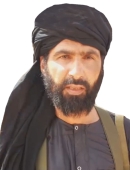
Lehbib Ould Ali Ould Said Ould Yumani, known as Adnan Abu Walid al-Sahrawi, was a Sahrawi Islamist militant and leader of the Islamic State in the Greater Sahara.
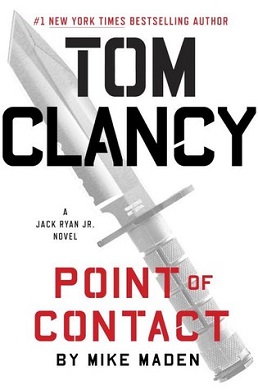
Point of Contact is a techno-thriller novel, written by Mike Maden and released on June 13, 2017. Set in the Tom Clancy universe, the novel depicts Jack Ryan Jr. as he helps avert a North Korean plot to crash the Asian stock market, along with his Hendley Associates colleague Paul Brown, in Singapore. Point of Contact marks Maden’s debut as the sole author of the Jack Ryan Jr. novels, succeeding Grant Blackwood. It debuted at number 3 on the New York Times bestseller list.
Mike Maden is an American novelist. He is well known for the Jack Ryan Jr. novels, which are part of the Tom Clancy universe, as well as for the Drone series of techno-thrillers.
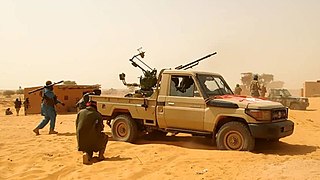
On 9 January 2020, a large group of Islamic State in the Greater Sahara militants assaulted a Nigerien military base at Chinagodrar, in Niger's Tillabéri Region. They attacked an army post in Chinagodrar, in the west of the country, in Tillabéri Region, 13 kilometres from the border with Mali, 210 kilometres north of Niamey. At least 89 Nigerien soldiers were confirmed to have been killed in the attack, with more casualties suspected, making it the worst attack on the army since the start of the insurgency. The Nigerien government said that 77 militants were killed.

An Islamist insurgency has been ongoing in the Sahel region of West Africa since the 2011 Arab Spring. In particular, the intensive conflict in the three countries of Mali, Niger and Burkina Faso has been referred to as the Sahel War.
Hassan Ag Fagaga, born around 1959 or 1966, in Kidal, Mali, was a Malian soldier and a Tuareg rebel.

















